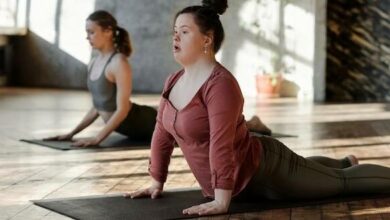Top 3 ways to get fit when you don’t have much time
Getting fit has been on your list of things to do for as long as you can remember but you just don’t have the time. Even when you get motivated and declare that this time will be different, the other priorities in your life crowd out your workout routine.
Christians are called to take good care of everything that they have and this includes their bodies. However, finding the time to work, take care of a family, contribute to your community, feed your spirit, and exercise regularly may feel like mission impossible. Since most people rarely neglect work, family, or our commitment to others, taking care of your body is often the thing that gets crowded out of the schedule.
The key to starting and sticking with an exercise program is committing to a realistic weekly schedule. By realistic, I mean a schedule that you can stick to without turning your life inside out even when work gets busy, the children are ill, or you need to travel.
While you may be waiting to have a couple of weeks that aren’t so busy to get started and get results, you don’t need to wait. You can get started and see results with whatever time you have for exercise right now- even if that is no time at all.
Here are three practical strategies (ranging from no time to limited time to even a bit more time) to leverage whatever time you have right now to get started and stay consistent.
STRATEGY 1: “I have NO time.”
If you feel completely overwhelmed by the demands of life and can’t commit to a daily practice of exercise, commit to sneaking physical activity into the pockets of your day. The simplest way to do this is to walk everywhere that you can. Park far away from your office or stores. Walk, even if you are just pacing, while you take conference calls, answer emails, or interact on social media. You may be surprised how much activity you can accumulate each day by making the conscious effort to move in the pockets of time in your schedule each day.
Don’t be fooled into thinking that walking is merely busy work unlikely to produce results. If you are a busy professional with a tightly packed schedule, walking may be the perfect exercise to help you relieve stress while getting active. Sonja, a busy wife and entrepreneur from Texas, began a daily walking regimen as a way to regain control of her health and fitness. She committed to a total daily step count as her sole means of exercise. As a result of making better food choices and staying consistent with walking, she lost over 40 pounds in less than a year.
STRATEGY 2: “I have about 10 -20 minutes to spare twice a week.”
If you can commit to dedicated time for exercise, do resistance-training circuits twice a week. This type of exercise helps you to maintain (and in some cases build) muscle, increase your stamina, and improve your function in daily life. On the days that you can’t commit to dedicated exercise time, follow the “I have no time” workout recommendation to stay active.
You may believe that short workouts aren’t enough to produce real results. However, when you focus on resistance training circuits that include compound movements like squats, lunges, and pushups, you can get a highly effective workout in less time than you spend on social media each day. Here’s an example of a short resistance training circuit that fits the bill:
Alexa, a busy stay at home mom, began doing two 20-minute resistance-training workouts each week while staying active with walking on the other days. In three short months, she had achieved significant results. She established a strong exercise habit despite struggling with consistency in the past. She dropped a full jean size, and increased her strength and stamina.
STRATEGY 3: “I have about 10 -20 minutes to spare every other day- sometimes more.”
If you can commit to dedicated time for exercise on most days of the week, do a mix of resistance training circuits and conditioning workouts. While resistance training offers many benefits, too much can have adverse effects. Adding conditioning workouts to your weekly schedule allows you to continue to challenge your body for improvements in stamina and function while still giving your muscles a chance to recover.
An example of a good weekly schedule would be to do resistance training on Monday and Thursday with a conditioning workout on Saturday. If you want to add more days, just be sure to have at least one day of rest between resistance training workouts.
Here’s an example of a conditioning workout to use on days you aren’t doing resistance training:
This approach is perfect for you if you enjoy training hard many days a week but you wish to reclaim some time for your priorities outside of the gym without compromising your results.
After having my first child, I was eager to lose the pregnancy weight and get back in shape. I wanted to have the energy to take care of my family as well as continue to run my personal training business. As someone who was used to exercising for a minimum of 45 minutes, five days each week, I was skeptical about whether or not I could really get results with shorter workouts. However, my new responsibilities and determination to keep my priorities in order were enough motivation to at least give the new approach a fair shot. I was thrilled to discover that I was able to lose over 50 pounds and perform at an even greater level of fitness than before my pregnancy from a year of consistency with intense, short workouts.
No matter how much time you have to dedicate to exercise, you can begin the process of getting more fit and successfully manage your weight. The results you will get from exercising with the time you have are extremely motivating.
After seeing initial success, many of my clients choose to reclaim more time from their weekly schedule to dedicate to exercise for even better results. Some of the ways that they have created more time include spending less time on social media, waking up 15-20 minutes earlier, and using their lunch break as time for training. All it takes is the time you have right now to begin to lead of life of greater health and fitness.
From Faith & Fitness Magazine April/May 2017. Reprinted with permission.






